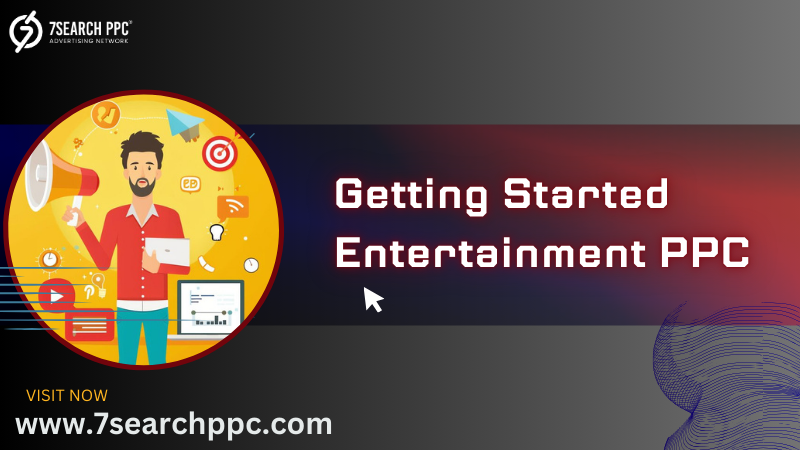In the world of entertainment PPC advertising has emerged as a powerful tool for reaching audiences with high precision and measurable outcomes. For businesses and agencies focused on media ads and entertainment promotion, PPC offers a unique way to connect with users actively interested in media, entertainment, and digital experiences. PPC campaigns tailored for the entertainment sector tap into user interests through search engines, social media, and networks, creating immediate visibility for brand messages.

Why Entertainment PPC?
With millions of potential viewers and users searching for movies, music, gaming, and streaming options daily, entertainment PPC ads allow companies to place their offerings directly in front of their target audience. The entertainment industry encompasses a wide range of platforms, from on-demand video streaming and live shows to gaming and social media. Entertainment PPC leverages data to display relevant ads to these audiences, helping brands capture attention in an increasingly competitive market.
Entertainment PPC ads can target specific demographics and interest groups, allowing brands to reach users with tailored ads. This precision makes PPC a cost-effective advertising model where businesses only pay when users click on their ads, ensuring better control over the ad budget and return on investment (ROI).
Understanding the Basics of Entertainment PPC
What is PPC Advertising?
PPC, or pay-per-click advertising, is an internet advertising model where advertisers pay a fee each time a user clicks on one of their ads. For the entertainment sector, this means using keywords, audience targeting, and relevant creatives to attract users interested in specific forms of entertainment. Ads appear on search engine results pages, social media platforms, and media ad networks.
Key Benefits of PPC for Entertainment Businesses
- Immediate Reach: PPC ads provide instant visibility, displaying ads to users immediately after the campaign goes live.
- Targeted Advertising: By targeting keywords and specific audiences, entertainment PPC campaigns reach users actively looking for content.
- Cost Control: With flexible budgets, advertisers can control costs by setting a maximum bid amount per click.
- Measurable Results: PPC platforms offer real-time analytics, allowing marketers to track performance and optimize campaigns.
How to Set Up an Entertainment PPC Campaign
Define Your Objectives
Every successful PPC campaign begins with clear objectives. Are you looking to drive more traffic to a movie streaming platform? Generate ticket sales for an event? Promote a new music release? Defining your goals will guide the selection of keywords, audience segments, and ad creatives.
Choose Your PPC Platform
Various platforms support PPC advertising, each with unique strengths for entertainment brands:
- Google Ads: Best for search-based PPC, Google Ads help reach users searching for specific entertainment content.
- Social Media Ads: Platforms like Facebook, Instagram, and TikTok enable audience targeting based on interests and behaviors, ideal for visual and video-based promotions.
- Media Ad Networks: These networks allow ads to be displayed on websites focused on entertainment and media, helping brands reach users interested in related content.
Selecting the platform depends on the type of entertainment being promoted and the target audience.
Target the Right Audience
Audience targeting is the heart of PPC campaigns, ensuring ads are shown to relevant users. For entertainment PPC, consider targeting based on:
- Interests: Users interested in specific entertainment genres (e.g., action movies, pop music, eSports).
- Demographics: Age, location, and other demographic factors to reach the right audience.
- Behavioral Data: Reaching users who have recently engaged with similar content or have shown interest in related entertainment.
Crafting Compelling Ad Copy for Entertainment PPC
To capture attention in a crowded digital space, ad copy must be engaging, clear, and relevant. For entertainment PPC ads, a few techniques can significantly improve click-through rates and conversions:
- Highlight Unique Value: Whether it’s a new release, a special promotion, or exclusive access, emphasize the unique offering.
- Use Actionable CTAs: Call-to-action (CTA) phrases like “Watch Now,” “Get Tickets,” or “Stream Today” can drive immediate responses.
- Incorporate Visual Elements: For social media and media ad network PPC, visuals and short videos often improve engagement and click-through rates.
Optimizing Entertainment PPC Campaigns with Media Ad Networks
Media ad networks are integral to the entertainment sector, enabling brands to reach audiences on relevant websites and apps. By placing ads on media-focused sites, entertainment companies can target users actively looking for entertainment content, thereby boosting ad relevance.
Advantages of Media Ad Networks for Entertainment PPC
- High Relevance: Ads shown on media sites resonate more with users looking for entertainment options.
- Native Advertising Opportunities: Media ad networks often support native advertising, where ads blend into site content, resulting in higher engagement.
- Access to Large Audiences: Media ad networks aggregate a wide range of sites, reaching millions of potential users.
When optimizing PPC for media ad networks, use engaging visuals, maintain clear messaging, and tailor creatives to the network’s user base.
Native Advertising: Enhancing Engagement in Entertainment PPC
Native advertising is a strategic addition to entertainment PPC, allowing brands to seamlessly integrate ads into platform content. Native ads are designed to look and feel like editorial content, making them less disruptive and more appealing to users.
Benefits of Native Advertising for Entertainment PPC
- Non-Intrusive Format: Native ads blend with content, making them feel more organic and less like ads.
- Higher Click-Through Rates: Because native ads don’t disrupt the user experience, they often result in higher engagement rates.
- Better Audience Targeting: Native advertising platforms allow precise targeting, increasing the chance of reaching interested users.
By using native advertising in entertainment PPC, brands can create a cohesive experience for users, boosting both click-through rates and conversions.
Tracking and Analyzing Entertainment PPC Campaign Performance
Tracking performance is essential for PPC campaigns, enabling continuous improvement and maximizing ROI. Key metrics to monitor in entertainment PPC include:
- Click-Through Rate (CTR): This shows how many people clicked on the ad, indicating ad relevance and engagement.
- Conversion Rate: The percentage of users who completed a desired action, such as buying a ticket or signing up.
- Cost Per Click (CPC): CPC indicates the average cost per click, helping advertisers manage their budget effectively.
- Return on Ad Spend (ROAS): This metric reveals the revenue generated for every dollar spent, critical for assessing campaign profitability.
Analyzing these metrics helps optimize campaigns by identifying high-performing keywords, refining targeting strategies, and improving ad creatives.
Best Practices for Entertainment PPC Success

Focus on Keyword Relevance
Keyword relevance is crucial for search-based PPC campaigns. Use keywords that reflect the intent of users searching for entertainment options, such as “watch movies online,” “concert tickets near me,” or “latest movie trailers.”
Use Retargeting to Re-engage Interested Users
Retargeting allows entertainment brands to re-engage users who have previously shown interest but didn’t complete a conversion. By showing follow-up ads, brands can increase the likelihood of conversions.
Experiment with Ad Formats
Entertainment PPC campaigns should leverage multiple ad formats to capture attention and encourage engagement. Use a combination of text, image, and video ads to keep the audience engaged and improve reach.
Adjust Bids Based on Performance
Regularly monitor the performance of keywords and placements, adjusting bids for high-performing ads to maximize visibility. Lowering bids for underperforming placements allows better budget allocation.
Conclusion
Getting started with Entertainment PPC can be a game-changer for brands in the media and entertainment ads industry. By creating targeted, engaging ads on platforms like Google Ads or Facebook, companies can reach audiences who are already interested in their content, increase brand visibility, and drive valuable traffic to their websites. Success in Entertainment PPC requires a strategic approach: understanding your audience, choosing relevant keywords, optimizing ad copy, and continually analyzing performance to improve. With these steps, your brand can harness the power of pay-per-click to enhance visibility and ROI in today’s competitive entertainment market.
Frequently Ask Questions (FAQs)
What is Entertainment PPC, and how does it work?
Ans. Entertainment PPC is a pay-per-click advertising model specifically tailored to promote entertainment products and services, including movies, music, live events, and streaming platforms. It works by targeting specific keywords and audience segments, displaying ads on search engines, social media, and media ad networks. Advertisers pay only when users click on their ads, making it a cost-effective way to reach interested audiences.
How can native advertising benefit my entertainment PPC campaign?
Ans. Native advertising enhances entertainment PPC by blending ads into the content of hosting sites, making them appear more organic and engaging. This approach typically leads to higher click-through rates and better audience targeting, improving the overall effectiveness of the campaign.
Which PPC platforms are best for entertainment advertising?
Ans. The best platforms for entertainment PPC include Google Ads for search-based targeting, social media platforms like Facebook and Instagram for visual ads, and media ad networks that display ads on entertainment-focused sites. Choosing the right platform depends on the type of audience and the specific entertainment offering being promoted.



